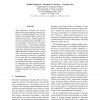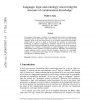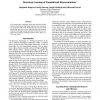135
click to vote
ACL
2012
13 years 4 months ago
2012
Most information extraction (IE) systems identify facts that are explicitly stated in text. However, in natural language, some facts are implicit, and identifying them requires ā...
104
click to vote
KI
2010
Springer
15 years 15 days ago
2010
Springer
Abstract. Unlike people, household robots cannot rely on commonsense knowledge when accomplishing everyday tasks. We believe that this is one of the reasons why they perform poorly...
111
click to vote
CORR
2006
Springer
15 years 2 months ago
2006
Springer
The purpose of this paper is twofold: (i) we argue that the structure of commonsense knowledge must be discovered, rather than invented; and (ii) we argue that natural language, w...
108
Voted
CONNECTION
2006
15 years 2 months ago
2006
To be autonomous, intelligent robots must learn the foundations of commonsense knowledge from their own sensorimotor experience in the world. We describe four recent research resu...
117
click to vote
AAAI
2007
15 years 4 months ago
2007
This paper reports on our recent work on modeling and automatically extracting vague, implicit event durations from text (Pan et al., 2006a, 2006b). It is a kind of commonsense kn...
130
click to vote
COOPIS
2002
IEEE
15 years 7 months ago
2002
IEEE
Abstract. Open Mind Common Sense is a knowledge acquisition system designed to acquire commonsense knowledge from the general public over the web. We describe and evaluate our firs...
107
click to vote
KCAP
2003
ACM
15 years 7 months ago
2003
ACM
Humans naturally share knowledge by telling stories. This is a form of knowledge exchange we engage in right from early childhood, and over time we learn to recall, order and orga...
KCAP
2003
ACM
15 years 7 months ago
2003
ACM
One of the long-term goals of Artiļ¬cial Intelligence is construction of a machine that is capable of reasoning about the everyday world the way humans are. In this paper, I ļ¬r...
106
click to vote
SPATIALCOGNITION
2004
Springer
15 years 7 months ago
2004
Springer
This paper gives the SNAP and SPAN ontologies relating to recognizing variable vista spatial environments, namely, SNAPVis and SPANVis. It proposes that recognizing spatial environ...
104
click to vote
WEBI
2005
Springer
15 years 7 months ago
2005
Springer
One of the principal problems of online help is the mismatch between the specialized knowledge and technical vocabulary of experts who are providing the help, and the relative naĆ...



